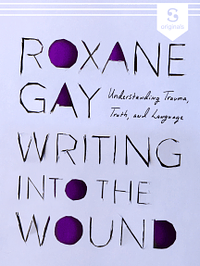Take a photo of a barcode or cover
fast-paced
challenging
dark
emotional
hopeful
informative
inspiring
reflective
sad
tense
fast-paced
reflective
reflective
fast-paced
challenging
reflective
sad
fast-paced
medium-paced
I feel like Roxane Gay just isn't the writer for me. This is the second work I've read, and while I like her as a person, her voice is engaging, and she's a great narrator, I always end up feeling super underwhelmed by her work. This one in particular felt like it didn't deliver on the title's promises, and I ended up asking, "Okay, but what was the point?" Like her previous work, it seemed meandering and unfocused, though I get why people like her because her tone is very conversational.
I didn't learn much about writing trauma (a subject I'm highly interested in); mostly, it was just about her personal experiences releasing her book Hunger into the world (which were mostly bad), and returning to her Ivy League university, this time as a teacher. It's more memoir than anything, and I feel like none of the conclusions she came to were particularly insightful or well-written. It's a shame because I think we agree on a lot of things politically, but for me, her work just isn't focused enough to be powerful.
I didn't learn much about writing trauma (a subject I'm highly interested in); mostly, it was just about her personal experiences releasing her book Hunger into the world (which were mostly bad), and returning to her Ivy League university, this time as a teacher. It's more memoir than anything, and I feel like none of the conclusions she came to were particularly insightful or well-written. It's a shame because I think we agree on a lot of things politically, but for me, her work just isn't focused enough to be powerful.
تحاول د.جاي شرح تجربتها عن الكتابة عن الصدمة، لندخل في مفارقة ماوراء المعرفة وماوراء الصدمة، وكل ما يتضمنه ذلك من مشاكل ومخاوف.
I am not entirely sure about what I have just read, because this was a concoction of heavy topics that each deserved their own spotlight, rather than to be mentioned briefly without any novel or genuine contribution to the discussion. The whole essay was pointless (and about Gay's own life stories, but it lacked her usual brilliance most of the time). There is barely anything in here about either trauma, truth, or language. I know this is not a physical book, but it still felt like a money-grubbing technique.
My relationship with Roxane Gay is difficult, because I love her until I don't. She flaunts her imperfections (being a bad feminist, etc.) in a wonderfully positive way, and you love her for it. But then there is no punch line to the joke, and she ends up encouraging you to be less than perfect, to not at least try to be your own version of a good feminist, instead of settling for being the "bad" one.
That one passage about her judgmental looks towards a "very thin" person who confessed to Gay that she had experienced the same kind of body-image trauma prior to losing weight! I wholly understood where Gay was coming from, because people can be mean and people judge and trauma is anything but a clear-cut straight-to-healing adventure. But you would expect her to at least mention how judging now-skinny people is not right: you don't know anything about their story and their own trauma. She doesn't say anything about that, though, not even in passing; and really, if I were that thin girl who had poured her heart out to Gay because she thought the author of such a powerful memoir as Hunger would understand, I would be pissed.
I found it ironic that even though Gay advises against writing self-centered trauma narratives, she never truly gave me the impression that she cared about her readers.
My relationship with Roxane Gay is difficult, because I love her until I don't. She flaunts her imperfections (being a bad feminist, etc.) in a wonderfully positive way, and you love her for it. But then there is no punch line to the joke, and she ends up encouraging you to be less than perfect, to not at least try to be your own version of a good feminist, instead of settling for being the "bad" one.
That one passage about her judgmental looks towards a "very thin" person who confessed to Gay that she had experienced the same kind of body-image trauma prior to losing weight! I wholly understood where Gay was coming from, because people can be mean and people judge and trauma is anything but a clear-cut straight-to-healing adventure. But you would expect her to at least mention how judging now-skinny people is not right: you don't know anything about their story and their own trauma. She doesn't say anything about that, though, not even in passing; and really, if I were that thin girl who had poured her heart out to Gay because she thought the author of such a powerful memoir as Hunger would understand, I would be pissed.
I found it ironic that even though Gay advises against writing self-centered trauma narratives, she never truly gave me the impression that she cared about her readers.
A quick read, but an excellent one. Honestly, I always enjoy what Dr. Gay has to say. I always feel as though I learn something from her, and this essay was no exception.





